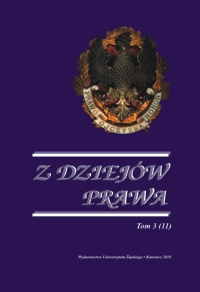Koncepcje ustrojowe Socjaldemokratycznej Partii Niemiec w latach 1945—1948
SPD system conceptions between 1945 and 1948
Author(s): Michał BożekSubject(s): Law, Constitution, Jurisprudence
Published by: Wydawnictwo Uniwersytetu Śląskiego
Summary/Abstract: In comparison to the remaining parties taking place in western occupational zones, Sociodemocratic Party of Germany (SPD) was in a more beneficial situation. In the case of sociodemocracy it was not about the process of creating a completely new party, but the process of restoring the formation acting legally in the territory of Germany for decades till 1933. The shape of the system of the postwar Germany, almost from the very beginning of the reactivation of the SPD action constituted one of the most important issues discussed among the party members. The foundations of this discussion were laid a day before the final war failure of the Third Reich. In 1944 the programme compromise in the ranks of the Union of German Socialist Organizations created in Great Britain in 1941 was reached. The effect of the very compromise constituted Directives concerning a German state system published in autumn in 1945 in London. A groundbreaking event for the works of the party on the conception of the system of the German state was the establishment of the Political-System Committee by the party board in September 1946. The head of the party board and minister of the foreign affairs of North-Rhine — Westfalia was Walter Menzel. The result of a few months’ works of the Committee constituted Directives concerning building the German Republic. They were accepted during the meeting of the party board in March 1947 and successively approved of unanimously by the convention of the Western-German SPD debating in Nurnberg in July 1947. The SPD politicians reservedly accepted the declaration of Western superpowers on the necessity of building the German state only in western borderlines in occupational zones. Starting from 1945 sociodemocracy was consistently in favour of regaining the unity of the postwar Germany divided as a result of consequences. The majority of SPD politicians understood, at the same time, that in face of the events taking place the division of the German state in the future to be predicted is unavoidable. According to them, the very situation will be temporary and, in a longer run, Germany will unite as a state and society. That is why the SPD was definitely against treating the projected Western-German state in the categories of the state with any legal and political consequences deriving from it. Therefore, the fact that both projects prepared in 1948 by W. Menzel were regarded as organizational statutes should not be surprising. Not only their form, but also systematicity and content of particular decisions did express the party’s objection to the idea of giving constitution to the Western-German state in the right meaning of the word.
Journal: Z Dziejów Prawa
- Issue Year: 11/2010
- Issue No: 3
- Page Range: 93-113
- Page Count: 21
- Language: Polish

